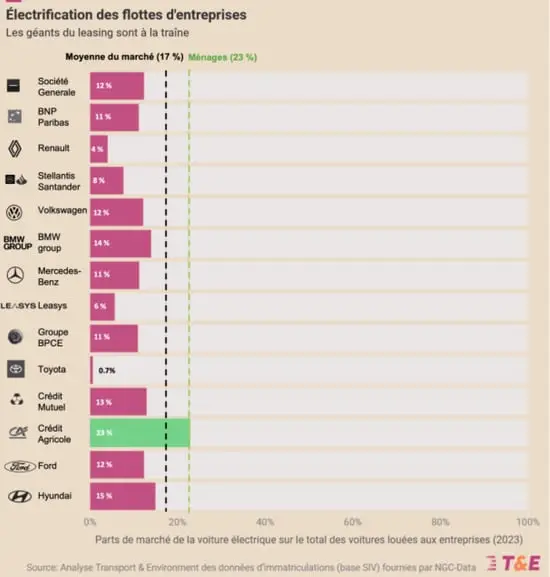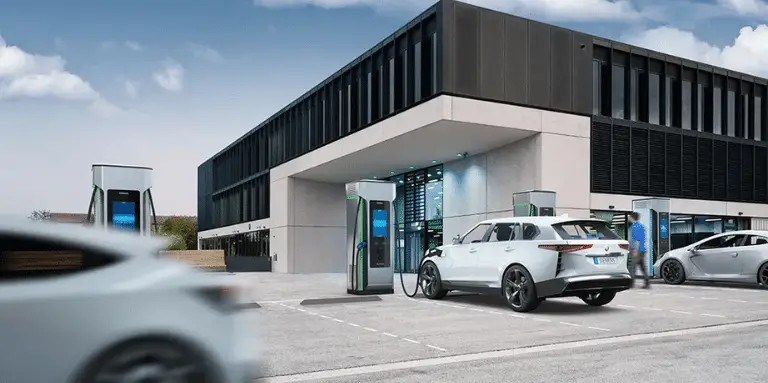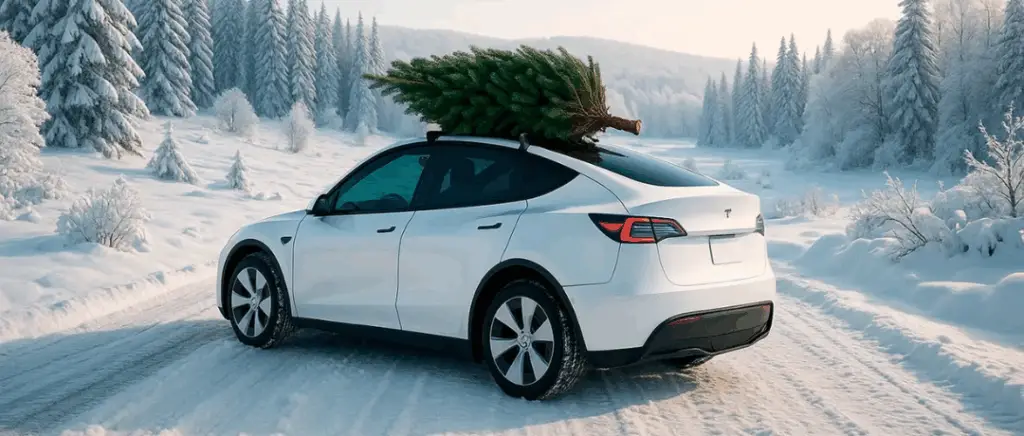Understanding the market for electric car fleets in the B2B sector
Current state of the market for electric car fleets in the B2B sector

The market for fleets of electric cars in the B2B sector is growing significantly, driven by a number of favourable factors. French companies are increasingly adopting electric vehicles for their fleets, motivated by the long-term economic benefits, government incentives and sustainability objectives.
This transition is particularly noticeable in the transport, logistics and service sectors. Car manufacturers are responding to this growing demand by offering a wider range of electric models tailored to professional needs, offering a greater degree of flexibility than ever before. autonomy and specific features for businesses. What's more, the continuing improvement in recharging infrastructure and advances in battery technology are helping to make electric fleets even more attractive to businesses.
Electric car fleets: what are the benefits for companies?
Reducing operating costs
Electric vehicles (EVs) offer significant fuel savings thanks to the cost of electricity, which is generally lower than that of petrol or diesel, making them more economical to use than internal combustion vehicles.
In addition, EVs benefit from simplified maintenance, as they have fewer moving parts and do not require oil lubrication, which significantly reduces the costs associated with maintenance and repairs compared with combustion-powered vehicles. These factors combine to make electric vehicles not only more environmentally friendly by reducing direct emissions, but also more economically advantageous for owners in the long term.
Tax and financial incentives
Companies can benefit from a range of financial and tax incentives for adopting electric vehicles (EVs). In France, for example, the government is offering a environmental bonus up to €4,000 per electric vehicle purchased, which represents a significant saving on the initial acquisition cost.
For example, electric vehicles may qualify for additional tax breaks, such as reductions on company vehicle tax (TVS), which are designed to encourage the use of more environmentally-friendly vehicles in company fleets.
What's more, companies can benefit from specific tax deductions for green investment, which helps to make EVs not only environmentally advantageous, but also financially attractive in the long term by reducing running costs and enhancing their sustainability on the market.
Access to low-emission zones (ZFE)
Electric vehicles (EVs) help companies to comply with increasingly stringent regulations on CO2 emissions and access to Low Emission Zones (LEZs), enabling them to avoid fines and traffic restrictions. By adopting EVs, companies can not only reduce their carbon footprintThis is essential if they are to maintain their competitiveness and regulatory compliance over the long term.
Improving brand image and corporate social responsibility (CSR)
By integrating fleets of electric vehiclesIn this way, companies can demonstrate a concrete commitment to the environment, reinforcing their brand image and their positioning in terms of social and environmental responsibility (SER).
This initiative can also play an important role in attracting talent, attracting environmentally aware employees and enhancing the company's reputation as a responsible and visionary employer. In this way, the adoption of electric vehicles goes beyond economic and regulatory benefits, also offering important strategic benefits in terms of reputation and attracting talent.
Technology and innovation
Electric vehicles (EVs) are equipped with advanced technologies such as telematics, predictive maintenance and analysis of driving data, enabling optimised fleet management. These innovations help to reduce operating costs by optimising maintenance planning and preventing breakdowns, while improving the overall efficiency of company operations.
By incorporating these features, EVs offer not only environmental and economic benefits, but also improved fleet management that meets the growing need for sustainability and performance in the automotive sector.
Challenges associated with the transition to electric car fleets in the B2B sector
The transition to electric car fleets in the B2B sector presents a number of major challenges.
Firstly, the high initial cost of electric vehicles poses a significant financial barrier, although the long-term savings on operating costs can be substantial. L'recharging infrastructure is also a key challenge, requiring major investment to meet the recharging needs of fleets spread across different sites.
Vehicle range management and longer recharge times compared with petrol vehicles have an impact on operational planning and vehicle availability. In addition, driver training to optimise energy efficiency and battery durability, as well as regulatory and environmental concerns relating to battery recycling, add further complexities to this transition.
Despite these challenges, a strategic approach including partnerships with suppliers, adapting fleet management software and using government incentives can facilitate the successful integration of electric vehicles into B2B operations, maximising the long-term benefits for businesses.
Simplify the installation of charging points in your company with Beev
Choosing the right electric vehicles for your business
What are the different types of electric vehicle available on the market?
There are several types of electric vehicles available on the market, each with its own characteristics:
1. Electric vehicles with battery (VEB or BEV)
These vehicles run solely on electricity, stored in a rechargeable battery. They emit no greenhouse gases when in use, and generally have a range of between 150 and 400 km.
2. Plug-in hybrid vehicles (PHV or PHEV)
Equipped with both an internal combustion engine and an electric motor, these vehicles can be recharged from an electrical socket. They can cover several dozen kilometres in 100% electric mode before the internal combustion engine takes over.
3. Hybrid vehicles (HEV)
These vehicles combine an internal combustion engine and an electric motor, but cannot be recharged from a socket. The battery is recharged during braking and deceleration. They consume around 30% less fuel than conventional vehicles.
4. Light hybrid vehicles (LHVs)
Similar to conventional hybrids, but with a smaller battery. They cannot operate solely in electric mode, even when stationary.
5. Extended Range Electric Vehicles (ERV)
These vehicles are powered by an electric motor, but have a small internal combustion engine that acts as a generator to recharge the battery when needed. This increases the vehicle's range.
6. Fuel cell electric vehicles (FCEV)
Also known as hydrogen-powered vehicles, they use a fuel cell to produce electricity from hydrogen, releasing only water as a by-product.
Each type of electric vehicle has its advantages and disadvantages in terms of range, emissions, cost and practicality. The choice will depend on the user's specific needs, driving habits and personal preferences.
Selection criteria for electric vehicles tailored to your needs
To choose an electric vehicle that perfectly meets your needs, there are several key criteria to consider:
- First of all, the range is important, determining the distance you can cover without recharging, adapted to your daily and occasional use.
- Next, examine the charging options available, assessing the maximum power accepted in alternating current (AC) and direct current (DC) for rapid recharging.
- You should also consider the type of vehicle that best suits your specific needs, whether it's a city car, a saloon or an SUV.
- The total cost of ownership, including potential savings on energy and maintenance, is another important point to compare, as is the financial assistance available, such as the ecological bonus.
The vehicle's performance, including engine power, acceleration and top speed, must match your expectations. The equipment and on-board technologies, such as driving aids and infotainment systems, also merit careful comparison. In addition, make sure that the vehicle's driving comfort and habitability meet your requirements.
The availability of a recharging network compatible with your usual journeys, as well as the possibility of recharging at home, are practical aspects not to be overlooked. Finally, if environmental impact is a key criterion for you, compare the carbon footprint of the different models available. Take the time you need to evaluate these criteria so you can choose the electric vehicle that best suits your lifestyle and specific needs.
Read more: What is the ideal professional electric vehicle?
Drawing up a strategy for your company's transition to electric car fleets
Electric cars for fleets: a worthwhile investment?
Electric cars for company fleets generally represent a profitable investment in the medium and long term. Although the initial purchase cost is often higher than that of combustion-powered vehicles, the savings made on fuel, servicing and maintenance more than offset this investment over time.
In addition, government incentives tax benefits and the positive image in terms of environmental responsibility contribute to the profitability of this investment. Reduced operating costs, thanks in particular to stable electricity prices that are generally lower than those for fossil fuels, mean a significant return on investment. However, profitability can vary depending on the specific characteristics of each company, such as the mileage covered, the charging infrastructure available and local environmental policies.
Conclusion
The transition to electric vehicles in the B2B sector represents a major strategic opportunity for companies, in terms of reducing operational costs, complying with environmental regulations and improving brand image. Despite the challenges of initial cost and charging infrastructure, the economic, fiscal and environmental benefits are substantial. Technological advances and government incentives are making this transition even more attractive.
Beev, an expert in electric mobility, can help you in this process, by helping you to choose the vehicles best suited to your needs and by providing you with customised solutions for effectively integrating electric vehicles into your fleet. With Beev, maximise the benefits of electrification and ensure the success of your transition to sustainable and innovative mobility.
































